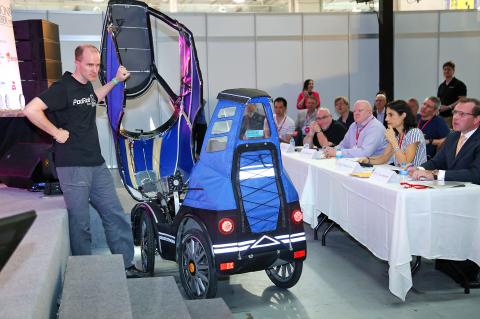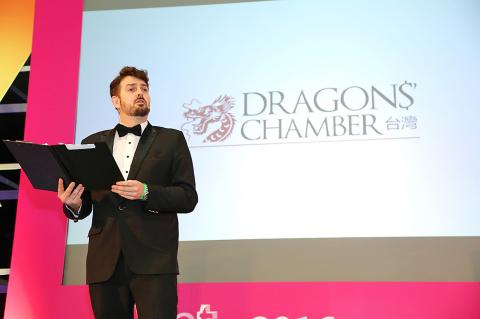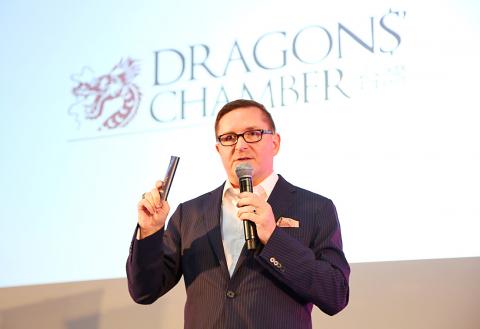John Kellenberger says a lack of access to funding is the greatest obstacle foreign entrepreneurs face when opening a business in Taiwan.
“There’s no way to get regular funding from a bank,” he says. “They’ll kind of laugh [at your proposal], unless you have a local spouse to co-sign for you.”
Kellenberger should know. A long-time Taiwan resident and founder of Reach to Teach, an education company, he’s been through those tough early days of starting a business.

Photo courtesy of Business Next Magazine
That’s why he and Josh Yang (楊智斐), both from the Canadian Chamber of Commerce Taiwan, teamed up with marketing company Enspyre to start Dragon Chamber Taiwan, a competition strictly for foreign startups — the first and only of its kind in Taiwan.
The aim of the event, which is in its second year, is to provide a sorely needed platform for foreign entrepreneurs to collaborate and share ideas.
It’s critical, Kellenberger says, for startups to have access to expert feedback, business mentors and a chance to network with other young companies.

Photo Courtesy of Business next magazine
Dragon Chamber Taiwan, part of Meet Taipei, the largest startup event in Asia, takes its inspiration from the US TV show Shark Tank. Held live on stage, participants have 10 minutes to pitch their startup plan to four “Dragon” judges who will then pepper them with questions, checking for any flaws in the plan.
The judges will evaluate teams in an open discussion on stage, which Yang says will give the audience and participants greater insight into what makes a strong business proposal.
Last year’s winner, Podride, an alternative transport company whose flagship product is a weatherproof four-wheel e-bike, has now raised over US$95,000 on Indiegogo, a crowdfunding Web site.

Photo courtesy of Business Next Magazine
Off the back of last year’s success, the event has expanded and this year will feature more prizes, high-profile judges and a talk by Elias Ek, cofounder of Enspyre and author of How to start a business in Taiwan. Also, with the aim of drawing larger crowds, entry this year will be free.
Kellenberger hopes the event will bring exposure for the teams, but also shine a light on the obstacles that foreign entrepreneurs face in getting started.
“There are lots of foreigners here with great ideas, but without the upfront cash, they can’t get started,” he says.
ENTREPRENEUR VISA
Kellenberger says the new legislation passed by the Tsai Ing-wen (蔡英文) administration aimed at easing entry requirements for foreign startups is “a step in the right direction.”
But, he says, the entrepreneur visa, started in July 2015, hasn’t proven popular.
Indeed, one year after the scheme was launched, only 30 applications had been made and 18 visas issued.
Kellenberger says that applying is a painstaking process, and that cutting red tape further would make a difference.
Right now, he adds, an Alien Resident Card is still tied to a work visa, making it illegal to start a company while still working as an employee. Most must wait until obtaining an Alien Permanent Residency Cards before starting up.
“Relaxing the process further would really help,” he says.
Kellenberger has plans to grow the event in the years to come, including televising and holding it biannually. Most importantly, he wants to double the number of teams.
“The greatest benefit for the teams,” Yang says, “is the feedback and the chance to develop their ideas to the next level.”

Towering high above Taiwan’s capital city at 508 meters, Taipei 101 dominates the skyline. The earthquake-proof skyscraper of steel and glass has captured the imagination of professional rock climber Alex Honnold for more than a decade. Tomorrow morning, he will climb it in his signature free solo style — without ropes or protective equipment. And Netflix will broadcast it — live. The event’s announcement has drawn both excitement and trepidation, as well as some concerns over the ethical implications of attempting such a high-risk endeavor on live broadcast. Many have questioned Honnold’s desire to continues his free-solo climbs now that he’s a

As Taiwan’s second most populous city, Taichung looms large in the electoral map. Taiwanese political commentators describe it — along with neighboring Changhua County — as Taiwan’s “swing states” (搖擺州), which is a curious direct borrowing from American election terminology. In the early post-Martial Law era, Taichung was referred to as a “desert of democracy” because while the Democratic Progressive Party (DPP) was winning elections in the north and south, Taichung remained staunchly loyal to the Chinese Nationalist Party (KMT). That changed over time, but in both Changhua and Taichung, the DPP still suffers from a “one-term curse,” with the

Jan. 26 to Feb. 1 Nearly 90 years after it was last recorded, the Basay language was taught in a classroom for the first time in September last year. Over the following three months, students learned its sounds along with the customs and folktales of the Ketagalan people, who once spoke it across northern Taiwan. Although each Ketagalan settlement had its own language, Basay functioned as a common trade language. By the late 19th century, it had largely fallen out of daily use as speakers shifted to Hoklo (commonly known as Taiwanese), surviving only in fragments remembered by the elderly. In

William Liu (劉家君) moved to Kaohsiung from Nantou to live with his boyfriend Reg Hong (洪嘉佑). “In Nantou, people do not support gay rights at all and never even talk about it. Living here made me optimistic and made me realize how much I can express myself,” Liu tells the Taipei Times. Hong and his friend Cony Hsieh (謝昀希) are both active in several LGBT groups and organizations in Kaohsiung. They were among the people behind the city’s 16th Pride event in November last year, which gathered over 35,000 people. Along with others, they clearly see Kaohsiung as the nexus of LGBT rights.